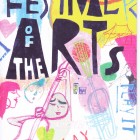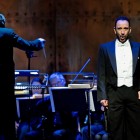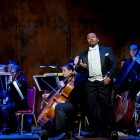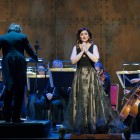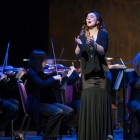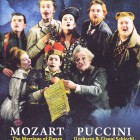Rossini Fireworks! 2018English Touring Opera
Read more about the opera General
This year the audience at Perth Festival got a second performance from regular visitors English Touring Opera, a mouthwatering concert of rare Rossini excerpts from his spectacularly difficult Neapolitan operas, justifiably entitled Fireworks!
With the four-year rebuild of Perth Theatre now completed, it seemed hard to justify the decision, on artistic grounds, for English Touring Opera to continue at the Concert Hall for staged opera. However, notwithstanding the expansion of the theatre (500 seats), the seating capacity is still far greater at the hall (1200), so on financial grounds the decision is understandable - only one performance of a popular work like The Marriage of Figaro needed to be given. Without wings or fly-tower, only technically simple stagings can be accommodated,
During the closure, ETO were unfortunately restricted to the most popular repertoire. Scottish audiences therefore missed out on several excellent productions of rare works. The second staged programme being toured was a revival of the Puccini double-bill of Il tabarro and Gianni Schicchi, which was brought to Perth in 2011, before the theatre closed. It did not return on this occasion.
Several of the extracts have not been performed in Scotland before and this delightful concoction, with a smaller, more specialist, audience anticipated, marked the first operatic event post-restoration in this beautiful and wonderfully intimate theatre. The new Figaro staging had been well received at its early performances down south, but this Rossini concert was at an altogether different level of achievement.
The serious operas Rossini composed for Naples from 1815 were particularly adventurous and forward looking. The company had spectacularly virtuosic tenors (including Nozzari, Garcia and David) as well as a brilliant soprano (Isabella Colbran) who was also a great dramatic performer. Rossini was therefore challenged to compose music of extreme difficulty - until quite recently thought almost impossible to perform. Nowadays there are more singers trained to cope. It is noticeable that basses were less important at this time.
Elisabetta, regina d'Inghilterra (1815) is, for British audiences at any rate, stymied by an improbable plot that highlights a rivalry between Robert Dudley, Earl of Leicester (good tenor) and the Duke of Norfolk (wicked tenor) concerning Leicester's wife Matilda and her brother Enrico, two children of Mary Queen of Scots as yet unknown to history. This work is actually of very high quality, musically and dramatically, and has a distinct novelty effect in the use of the orchestra instead of keyboard to accompany the recitatatives.
Otello (1817) employs tenors for the roles of Rodrigo and Iago as well as the title role. A wonderful highlight, as in Verdi's later treatment of the subject, is Desdemona's Willow Song, a master class in bel canto technique. On a lighter note, Rodrigo's big aria was later transmoggified (by another composer) into the famous Duetto Buffo di Due Gatti or Cats' Duet.
Ermione (1819) is an extraordinary piece of classical Greek tragedy, so forward thinking that even the Neapolitans found it difficult to accept, and it disappeared after its opening performance. Its tragic climax would be worthy of Beethoven, and the title role is a fearsome creation.
La donna del lago (1819) is based on Sir Walter Scott's famous poem The Lady of the Lake and contains some of Rossini's most beautiful lyrical music. King James V and Rhoderick Dhu are the two rival tenors, while Ellen's eventually successful suitor, Malcolm Graeme, is a trouser role for mezzo. The woodwind writing in this opera is quite special.
Maometto Secondo (1820) is the grandest of them all. It pitches high-flown romance into a war between the Turks and Venetians in 1476, and was later adapted for Paris as The Siege of Corinth.
The programme as performed was:
Semiramide (Venice 1823) - Overture.
Otello - Act 3 Willow Song (CC).
Maometto II - Act 2 Trio 'In questi estremi istanti' (GR, CC, JCG).
Ermione - Act 2 Gran Scena (GR, LB).
La donna del lago - Act 1 Cavatina 'Mura felice' (CC).
Otello - Act 2 Duet 'Ah vieni, nel tuo sangue! (LB, JCG).
Elisabetta, regina d'Inghilterra - Act 2 Scene 'Della cieca fortuna'.....'Deh! Sensa i trasporti' (LB, JCG).
Maometto II - Act 2 Aria 'Non temer d'un basso affetto' (CC).
Guillaume Tell (Paris 1829) - Recit and Aria 'Sombre forêt' (GR)
Elisabetta, regina d'Inghilterra - Act 2 Aria 'Dov'è Matilde' and Trio (GR, CC, LB).
This wonderfully entertaining programme was only being given seven times during ETO's long spring tour. This was the fifth, and the first at which Gillian Ramm appeared (Elena Xanthoudakis having done the first four). Instead of dealing with one opera at a time, as website and programme had suggested, the items were arranged in a more satisfying way, with varied moods following one another. Also there were no 'bleeding chunks', but substantial scenes to allow the dramas to develop.
After the overture, by a long way the most familiar item, the first vocal piece was the exquisitely haunting Willow Song, introduced with a delicately played harp solo (Vicky Lester) and eloquently delivered by Catherine Carby. She was then joined by soprano and tenor for a rousing trio from Maometto Secondo. The serious meat of the first part was the hair-raising sequence from the astonishing Ermione, with Gillian Ramm joined by Luciano Botelho in some spectacular singing. The yearning excerpt from The Lady of the Lake, Malcolm Graeme's return home, restored sanity, before the first sequence ended with the rivalry of Otello (John-Colyn Gyeantey) and Rodrigo (Luciano Botelho) bringing the house down.
The second half began with Luciano Botelho on lyrical form in Leicester's dungeon aria awaiting execution, before he is joined by the deceitful Norfolk promising rescue. More tenorial fireworks. Calbo's beautifully elaborate aria from Maometto followed. A complete contrast was provided by Mathilde's famous aria from Wiliam Tell - composed a decade later and entirely different in its shaping of bel canto line. The evening ended with a wonderfully paced sequence from Elisabetta, with aria, dramatic recitative, duet and trio all building to a great climax. The Queen, (Catherine Carby) meditates on the prospect of her own love Leicester gaining a divorce. Matilda is brought in to plead for her to spare husband and brother. Leicester then gets involved with the two women in his life. Great stuff.
Of the singers, Gillian Ramm has appeared in Perth several times with ETO, and the voice has developed into a fine dramatic instrument. The contrasting sections from Ermione and William Tell were very impressive. Brazilian Luciano Botelho has worked with both ETO and Scottish Opera, and now has a justified international career specializing in these fiendish parts. John-Colyn Gyeantey toured with Scottish Opera a few years ago as Camille in The Merry Widow. and this was just as enjoyable in a completely different style, of course. The Australian mezzo Catherine Carby is also remembered as a last minute stand-in for Sarah Connolly as Octavian in Der Rosenkavalier. Her contrasting parts ranged spectacularly from the gentle Willow Song and Lady of the Lake piece on one hand through the fireworks of Calbo to the spectacular drama of Queen Elizabeth.
The evening was guided in excellent style by conductor John Andrews. If the orchestral playing was less good at the start this was probably attributable to the fact that the players were dusting the music down after nearly a month-long gap. They quickly acclimatised to this and to their unfamiliar position on the Perth Theatre stage, This was a thoroughly memorable and rare event that should have attracted opera audiences from far and wide. Perth is quite accessible from all the other Scottish cities and it is sad that so few people seem prepared to travel from the central belt population centres.
